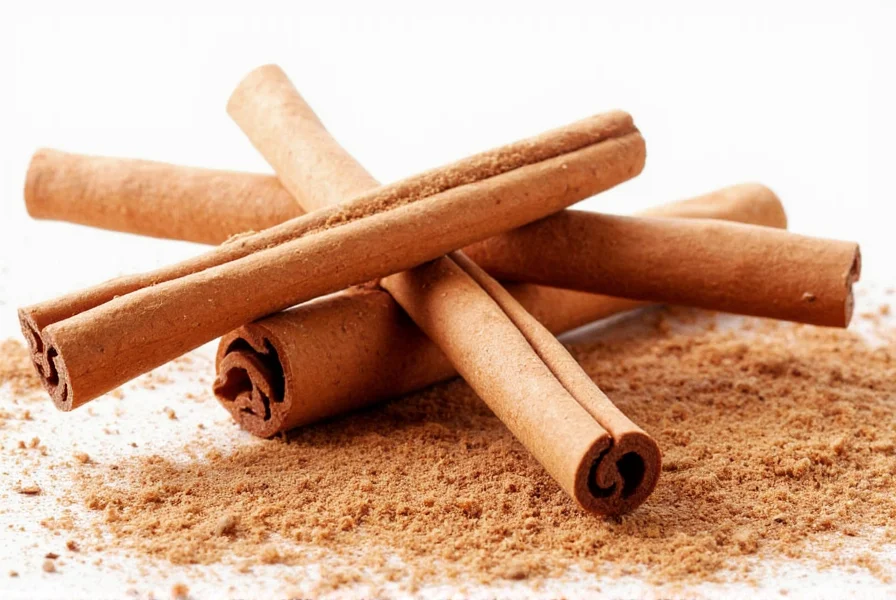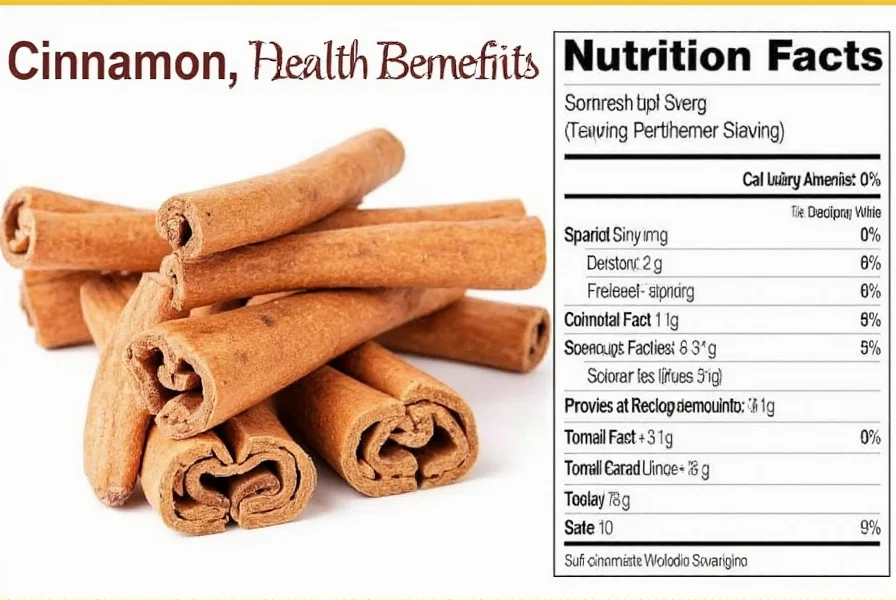Cinnamon isn't just a flavorful spice for your morning coffee or baked goods—it's a nutritional powerhouse with centuries of medicinal use. Understanding the complete nutritional profile of cinnamon helps you make informed decisions about incorporating this versatile spice into your diet. Whether you're monitoring blood sugar levels, seeking antioxidant-rich foods, or simply curious about this common kitchen staple, knowing the precise nutrition facts on cinnamon provides valuable insights for your health journey.
Nutritional Breakdown of Cinnamon
When examining cinnamon nutrition facts, it's important to understand the specific nutrient composition. Cinnamon's nutritional value per teaspoon makes it a low-calorie addition to foods with significant micronutrient benefits. The primary nutritional components contribute to cinnamon's reputation as both a flavor enhancer and potential health promoter.
| Nutrient | Amount per Teaspoon (2.6g) | % Daily Value |
|---|---|---|
| Calories | 6 | 0% |
| Total Carbohydrate | 2.1g | 1% |
| Dietary Fiber | 1.4g | 5% |
| Sugar | 0.1g | 0% |
| Total Fat | 0.1g | 0% |
| Protein | 0.1g | 0% |
| Manganese | 0.4mg | 18% |
| Calcium | 26mg | 3% |
| Iron | 0.2mg | 1% |
| Vitamin K | 1.1mcg | 1% |
Ceylon vs Cassia Cinnamon: Nutritional Differences
Not all cinnamon is created equal. The two primary varieties—Ceylon ("true" cinnamon) and Cassia (common in supermarkets)—have distinct nutritional profiles and health implications. Understanding these differences is essential when considering cinnamon nutrition facts for health purposes.
Cassia cinnamon contains significantly higher levels of coumarin, a compound that can be harmful in large quantities. Just one teaspoon of Cassia cinnamon may contain up to 12mg of coumarin, while the same amount of Ceylon cinnamon contains only trace amounts (less than 0.05mg). The European Food Safety Authority recommends a maximum daily intake of 0.1mg of coumarin per kilogram of body weight.
For those interested in the nutritional value of cinnamon per teaspoon specifically for blood sugar management, both varieties show promise, but Ceylon is generally preferred for regular consumption due to its lower coumarin content. Research suggests that cinnamon's ability to improve insulin sensitivity appears in both types, though most clinical studies haven't distinguished between varieties.

Health Benefits Supported by Research
The health benefits of cinnamon spice extend beyond its pleasant flavor. Numerous studies have investigated cinnamon's potential effects on various health markers:
- Blood sugar regulation: Multiple clinical trials indicate that cinnamon may help lower fasting blood glucose levels by 10-29% in people with type 2 diabetes. The mechanism appears to involve improved insulin sensitivity and slowed carbohydrate digestion.
- Antioxidant properties: Cinnamon ranks #1 among 26 common spices for antioxidant activity. Its polyphenols help combat oxidative stress, which contributes to aging and disease development.
- Anti-inflammatory effects: The cinnamaldehyde in cinnamon demonstrates significant anti-inflammatory properties, potentially reducing chronic inflammation markers.
- Heart health: Some research suggests cinnamon may help reduce triglycerides, LDL cholesterol, and total cholesterol levels in people with metabolic disorders.
It's important to note that while these findings are promising, most studies use concentrated cinnamon extracts rather than culinary amounts. The question of how much cinnamon should I consume daily for health benefits remains nuanced—most experts recommend 1-2 teaspoons of Ceylon cinnamon per day as a safe and potentially beneficial amount.
Practical Considerations for Daily Consumption
When incorporating cinnamon into your diet, consider these practical guidelines based on current understanding of cinnamon nutrition facts:
- Choose Ceylon cinnamon for regular, long-term use due to its significantly lower coumarin content
- Limited Cassia consumption (up to 1 teaspoon daily) is generally safe for most adults
- Those with liver conditions should be particularly cautious with Cassia cinnamon
- People taking blood thinners should consult their healthcare provider before increasing cinnamon intake
- Cinnamon works best when combined with a balanced diet rather than viewed as a standalone solution
The question of is cinnamon good for blood sugar control has generated considerable research interest. While results are promising, cinnamon should complement—not replace—established diabetes management strategies. The American Diabetes Association doesn't currently recommend cinnamon as a standard treatment, but acknowledges its potential as part of a comprehensive approach.

How to Maximize Cinnamon's Nutritional Benefits
To get the most from cinnamon's nutritional profile, consider these evidence-based approaches:
- Pair cinnamon with foods that have a high glycemic index to potentially moderate blood sugar spikes
- Use freshly ground cinnamon when possible, as volatile compounds like cinnamaldehyde may degrade over time
- Combine cinnamon with black pepper to potentially enhance absorption of its beneficial compounds
- Incorporate cinnamon into morning routines, as some research suggests timing may influence metabolic effects
- Store cinnamon in an airtight container away from light to preserve its antioxidant content
Understanding the complete picture of cinnamon nutrition facts and health effects helps you make informed decisions about this ancient spice. While cinnamon offers impressive nutritional benefits, it's most effective as part of an overall healthy eating pattern rather than a miracle cure. The growing body of research on cinnamon's health properties continues to refine our understanding of how this common kitchen staple can contribute to wellness when used appropriately.











 浙公网安备
33010002000092号
浙公网安备
33010002000092号 浙B2-20120091-4
浙B2-20120091-4